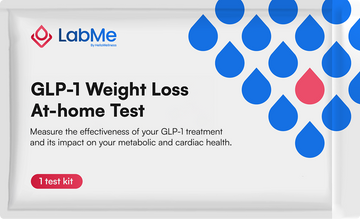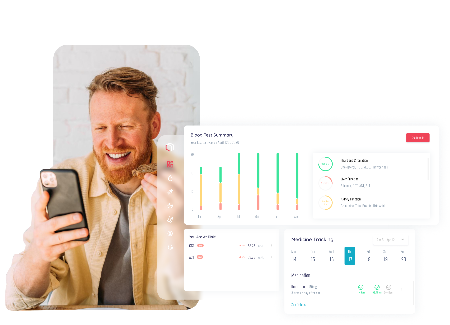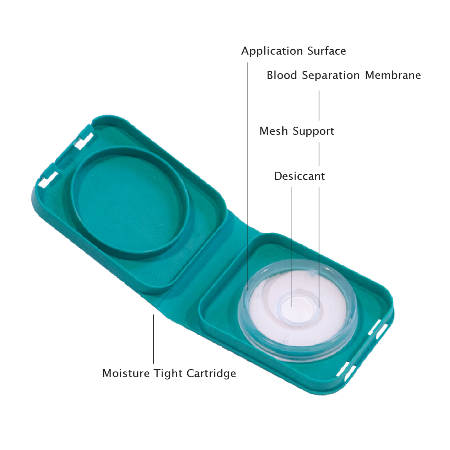Results available within 48 hours of test arrival to our partner labs
All tests are processed
in CLIA certified &
CAP accredited labs
Free shipping to your home and to
the laboratory
GLP-1 Measurement Test
Price
Take this GLP-1 at-home blood test before starting weight loss treatment to establish a baseline of your metabolic, cardiovascular, and even thyroid biomarkers.
After your treatment, repeat the test at least every 3 months to measure the effectiveness of your GLP-1 treatment and its impact on your metabolic, cardiac, and thyroid health.
Online & PDF results are typically available 3-5 days after our lab receives your test.
Note: Our at-home GLP-1 test panel is not a diagnostic test and cannot confirm any specific illness or disease. Further testing and medical consultation may be required to determine the cause of abnormal results.
What Tests Are Included?
Results available within 48 hours of test arrival to our partner labs
All tests are processed
in CLIA certified &
CAP accredited labs
Free shipping to your home and to
the laboratory


GLP-1 Measurement Test
Price


GLP-1 Measurement Test
If you're about to start a GLP-1 treatment or have started one, it's the perfect time to measure your metabolic and cardiovascular biomarkers
All LabMe GLP-1 Measurement Tests are performed by high complexity CLIA and CAP licensed laboratories undergoing routine audits.
Always share your results with your personal doctor - having tracked blood data can help your healthcare team make accurate decisions faster.
Who Should Consider Taking This GLP-1 Measurement Test?
If you're about to start a GLP-1 treatment or have started one, it's the perfect time to measure your metabolic and cardiovascular biomarkers
All LabMe GLP-1 Measurement Tests are performed by high complexity CLIA and CAP licensed laboratories undergoing routine audits.
Always share your results with your personal doctor - having tracked blood data can help your healthcare team make accurate decisions faster.
Why Measure Your GLP-1 Treatment?
Regular testing of biomarkers can act as an early detection system. Especially if you're not getting enough sleep, have improper nutrition, substandard training, unwise lifestyle choices, or weak bone health. LabMe helps by detecting non-optimal levels of blood biomarkers.
What You're Measuring
Biomarkers tested
Hemoglobin A1c (HbA1c)
Measures the percentage of Hemoglobin A1c to total hemoglobin. Hemoglobin A1c (HbA1c) is a blood test that measures your average blood sugar levels over the past 2-3 months. Healthcare providers check HbA1c to screen for diabetes and assess how well people with prediabetes and diabetes have been managing their blood sugar levels.
Estimated Average Glucose (EAG)
Estimates the glucose value using HbA1c values. Estimated average glucose (eAG) is an estimated average of your blood sugar (glucose) levels over a period of 2 to 3 months. It is based on your A1C blood test results. Knowing your eAG helps you predict your blood sugar levels over a time. A person with diabetes should aim for an eAG less than 154 mg/dl (A1C < 7%) to lower the risk for diabetes complications. While A1C/eAG values are important for long-term diabetes management, they can’t replace daily blood glucose tests: Neither is indicative of current blood sugar levels.
Total Cholesterol
Quantitative analysis of Total Cholesterol, comprising of Low-Density Lipoprotein (LDL) Cholesterol, High-Density Lipoprotein (HDL) Cholesterol, Very Low-Density Lipoprotein Cholesterol. Assay range: 100 to 400 mg/dL total cholesterol. Precision: CV of 2.0% with a SD of 4.3 mg/dL at clinically relevant levels. Total cholesterol is a measure of the total amount of cholesterol in your blood, including both "good" (HDL) and "bad" (LDL) cholesterol. Checking total cholesterol levels helps healthcare providers assess your risk of heart disease and stroke. Maintaining healthy total cholesterol levels through diet, exercise, and medication if necessary, is important for protecting your heart health and overall well-being.
High-Density Lipoprotein Cholesterol (HDL)
Quantitative analysis of High-Density Lipoprotein cholesterol (HDL-C), measuring the concentration of high-density lipoprotein cholesterol in the blood. Assay range: 25 to 100 mg/dL HDL-C Precision: CV of 3.0% with a SD of 1.6 mg/dL at clinically relevant levels. High-density lipoproteins (HDL cholesterol), often known as "good" cholesterol, helps remove excess cholesterol from your bloodstream, reducing the buildup of plaque in your arteries. Higher levels are associated with a lower risk of heart disease and stroke. Lifestyle interventions like maintaining a healthy diet, exercising regularly, and avoiding smoking can help increase HDL cholesterol levels, promoting better heart health and reducing the risk of cardiovascular problems.
Triglycerides
Quantitative analysis of Triglycerides, measuring the concentration of triglycerides in the blood. Assay range: 50 to 400 mg Triglycerides. Precision: CV of 2.4% with a SD of 2.5 mg/dL at clinically relevant levels. Triglycerides are a type of fat found in your blood that your body uses for energy. High levels of triglycerides can increase your risk of heart disease and other health problems. Healthcare providers check triglyceride levels to assess cardiovascular risk and determine if you might need lifestyle changes or treatments to lower your risk. Lifestyle interventions, such as eating a healthier diet, exercising regularly, and avoiding alcohol and sugary foods, can help lower your triglyceride levels and improve your overall health.
Total Cholesterol/HDL Ratio
The cholesterol-to-HDL ratio is a comparison of your total cholesterol level to your HDL cholesterol level. It helps healthcare providers assess your risk of cardiovascular disease. A lower ratio is healthier. Lifestyle interventions like eating a healthy diet, exercising regularly, and avoiding smoking can help improve your cholesterol to HDL ratio, reducing the risk of heart disease and stroke.
LDL/HDL Cholesterol Ratio
A high serum LDL:HDL ratio can be predictive of sudden cardiac death in middle age men. It is a good idea to keep this as a baseline over time to give a clearer picture of how your lifestyle is affecting your health. The optimal ratio is below 2.5. The ratio that shows moderate risk is between 2.5 and 3.3, and the ratio above 3.3 indicates high risk.
Low-Density Lipoprotein Cholesterol (LDL)
Low-density lipoprotein ("LDL cholesterol"), often referred to as "bad" cholesterol, is a type of cholesterol that can build up in your arteries, leading to plaque formation and increasing your risk of heart disease and stroke. Monitoring LDL cholesterol levels is crucial because higher levels are associated with a greater risk of cardiovascular problems. Lifestyle interventions such as following a healthy diet, exercising regularly, and maintaining a healthy weight can help lower LDL cholesterol levels and reduce the risk of heart disease and stroke.
Very-Low Density Lipoprotein Cholesterol (VLDL)
VLDL (very low-density lipoprotein) is a type of cholesterol that carries triglycerides, a kind of fat, in your blood. High levels of VLDL can contribute to plaque buildup in your arteries, increasing the risk of heart disease and stroke. Healthcare providers check VLDL levels to assess your risk of cardiovascular disease and to guide treatment decisions. Lifestyle interventions such as eating a healthy diet, exercising regularly, and avoiding smoking can help lower VLDL levels.
Gamma-Glutamyl Transferase (GGT)
Gamma-glutamyl transferase (GGT) is an enzyme that is found in many organs throughout the body, with the highest concentrations found in the liver. GGT is elevated in the blood in most diseases that cause damage to the liver or bile ducts. Normally, GGT is present in low levels, but when the liver is injured, the GGT level can rise. GGT is usually the first liver enzyme to rise in the blood when any of the bile ducts that carry bile from the liver to the intestines become obstructed, for example, by tumors or stones. This makes it the most sensitive liver enzyme test for detecting bile duct problems. GGT levels are sometimes increased with consumption of even small amounts of alcohol. Higher levels are found more commonly in chronic heavy drinkers than in people who consume less than 2 to 3 drinks per day or who only drink heavily on occasion (binge drinkers). The GGT test may be used in evaluating someone for acute or chronic alcohol abuse.
Blood Creatinine
Creatinine is a waste product produced by your muscles and filtered out of your blood by your kidneys. Importantly, creatinine levels assess how well your kidneys are functioning. Elevated creatinine can indicate kidney problems or damage, which can be caused by conditions like chronic kidney disease, dehydration, or certain medications. Monitoring creatinine helps healthcare providers ensure your kidneys are working properly and to detect any issues early.
Shipping & Return Policy
Shipping
We ship most orders within 24-48 hours of receiving them. Depending on the shipping method you select at checkout you may receive your order within 2 to up to 5 days. Your order includes shipping to your home and from your home to the lab.
Shipping Recommendations
It’s important that you ship your sample the same day you take it. Please do not take your sample on Friday as that will cause delays in processing your results.
Return Policy
Due to the nature of our products, full refunds are not accepted for any open products. You can ship your un-used, un-open test kit back to us in it’s original packaging within 7 days of delivery for store credit or a replacement kit. If you’d like a cash refund back to the original payment method, there will be a 25% re-stocking fee deducted from the refund amount.
Avoiding Errors In Your Results
TNP or Test Not Performed
What does it mean?
TNP is a result of a test with a faulty sample. Less than 8% of our tests results in a TNP or Test Not Performed. This means that the machines could not analyze your sample for any of the following reasons below.
Hemolysis
This can occur due to factors like applying excessive pressure on the finger during blood collection or not properly drying the finger before using the lancet.
Not Enough Blood
In some cases, an inadequate amount of blood collected can result in inconclusive findings. Please fill the tube up to the 500ml line at a minimum
Sample Contamination
Washing your hands with soap and not washing it all off correctly or applying too much alcohol on your finger before taking your sample, or taking a sample on a finger that was not been disinfected can lead to contamination of your sample
How to minimize your chances of an Error or TNP
To minimize the chances of receiving an inconclusive result, please follow these guidelines: Adhere closely to the provided instructions. Be gentle when collecting blood samples and ensure your finger is clean and dry before using the lancet. Promptly ship your sample to avoid heat exposure.
Insure Your Sample
Choosing Insurance
What does it cover?
Insurance is optional and will be presented to you during the checkout process. If you choose to opt-in for insurance, your test will be covered in case of TNP errors. Instead of paying full price of the test, you'd only have to cover a small deductible of $30 for shipping.
How to submit a claim for a replacement?
Please contact to us via live chat so we can start the replacement process for you.
What if I don't want insurance and get a TNP?
Pretty much the same thing as if you choose to drive your car without insurance, in case of accidents, you'd have to cover all the costs out of pocket. The cost of materials, one-day shipping, laboratory testing, and fulfilling is expensive. In case you choose to opt-out for insurance, you'd have to pay the full price of the test if you get a TNP and would like to re-take it. There are no exceptions to this.


Discover what your results mean in the Lab Me Dashboard
Understanding your health, training, nutrition, and diet has never been easier or more convenient. The Lab Me dashboard can tell you what each biomarker means and it impacts your health.
The Lab Me Difference
Lab Me follows a rigorous validation process to assure each biomarker is capable of meeting all precision and reproducibility before inclusion on our test menu.
We use apatented plasma membrane separation system that outperforms traditional dry blood spot cards.
This collection device is a convenient way to collect a blood sample in the comfort and privacy of your home for laboratory analysis.
This is the only fast, easy, and needle-free collection device that requires 4 drops of blood from the fingertip.

FAST, SIMPLE & ACCURATE
How To Get Started Today
Step 1Order your Lab Me test
Choose a test that fits your specific needs. We automatically get an MD to sign off so you avoid sitting in a doctor's office or clinic.
Step 2Take the test at home
Collect your specimen in the morning (8am is best). Return your sample within 3 days, using the prepaid shipping label provided.
Step 3Get your results within 48 hours
Once your sample arrives in the laboratory, confidential results will be available from your secure online account within 48 hours.
Hear From Other People That Care About Their Health






















